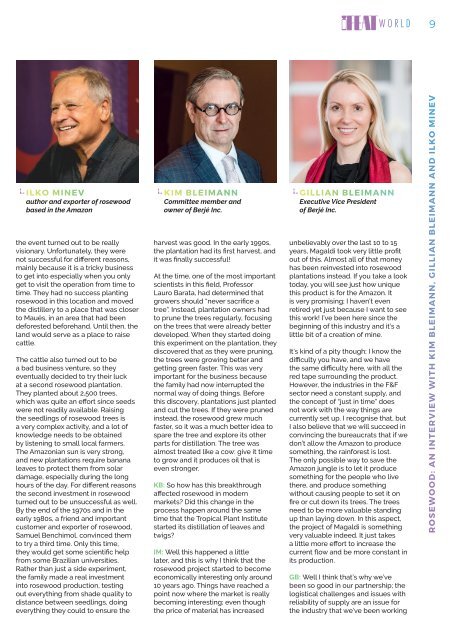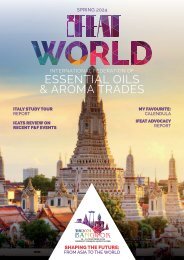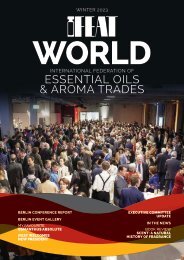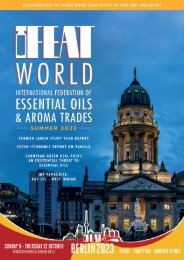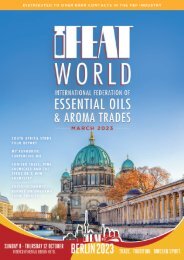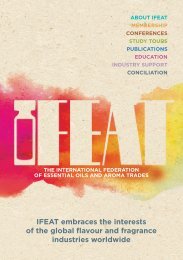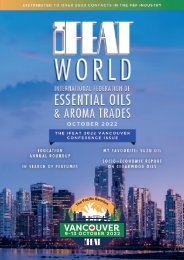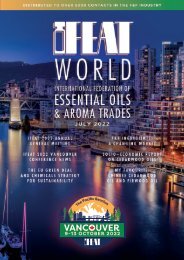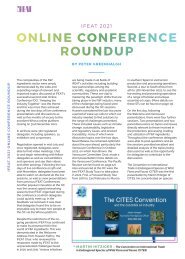IFEATWORLD September 2021
IFEATWORLD is an aroma trades publication for members of IFEAT - The International Federation of Essential Oils & Aroma Trades
IFEATWORLD is an aroma trades publication for members of IFEAT - The International Federation of Essential Oils & Aroma Trades
- No tags were found...
You also want an ePaper? Increase the reach of your titles
YUMPU automatically turns print PDFs into web optimized ePapers that Google loves.
WORLD 9<br />
ILKO MINEV<br />
author and exporter of rosewood<br />
based in the Amazon<br />
the event turned out to be really<br />
visionary. Unfortunately, they were<br />
not successful for different reasons,<br />
mainly because it is a tricky business<br />
to get into especially when you only<br />
get to visit the operation from time to<br />
time. They had no success planting<br />
rosewood in this location and moved<br />
the distillery to a place that was closer<br />
to Maués, in an area that had been<br />
deforested beforehand. Until then, the<br />
land would serve as a place to raise<br />
cattle.<br />
The cattle also turned out to be<br />
a bad business venture, so they<br />
eventually decided to try their luck<br />
at a second rosewood plantation.<br />
They planted about 2,500 trees,<br />
which was quite an effort since seeds<br />
were not readily available. Raising<br />
the seedlings of rosewood trees is<br />
a very complex activity, and a lot of<br />
knowledge needs to be obtained<br />
by listening to small local farmers.<br />
The Amazonian sun is very strong,<br />
and new plantations require banana<br />
leaves to protect them from solar<br />
damage, especially during the long<br />
hours of the day. For different reasons<br />
the second investment in rosewood<br />
turned out to be unsuccessful as well.<br />
By the end of the 1970s and in the<br />
early 1980s, a friend and important<br />
customer and exporter of rosewood,<br />
Samuel Benchimol, convinced them<br />
to try a third time. Only this time,<br />
they would get some scientific help<br />
from some Brazilian universities.<br />
Rather than just a side experiment,<br />
the family made a real investment<br />
into rosewood production, testing<br />
out everything from shade quality to<br />
distance between seedlings, doing<br />
everything they could to ensure the<br />
KIM BLEIMANN<br />
Committee member and<br />
owner of Berjé Inc.<br />
harvest was good. In the early 1990s,<br />
the plantation had its first harvest, and<br />
it was finally successful!<br />
At the time, one of the most important<br />
scientists in this field, Professor<br />
Lauro Barata, had determined that<br />
growers should “never sacrifice a<br />
tree”. Instead, plantation owners had<br />
to prune the trees regularly, focusing<br />
on the trees that were already better<br />
developed. When they started doing<br />
this experiment on the plantation, they<br />
discovered that as they were pruning,<br />
the trees were growing better and<br />
getting green faster. This was very<br />
important for the business because<br />
the family had now interrupted the<br />
normal way of doing things. Before<br />
this discovery, plantations just planted<br />
and cut the trees. If they were pruned<br />
instead, the rosewood grew much<br />
faster, so it was a much better idea to<br />
spare the tree and explore its other<br />
parts for distillation. The tree was<br />
almost treated like a cow: give it time<br />
to grow and it produces oil that is<br />
even stronger.<br />
KB: So how has this breakthrough<br />
affected rosewood in modern<br />
markets? Did this change in the<br />
process happen around the same<br />
time that the Tropical Plant Institute<br />
started its distillation of leaves and<br />
twigs?<br />
IM: Well this happened a little<br />
later, and this is why I think that the<br />
rosewood project started to become<br />
economically interesting only around<br />
10 years ago. Things have reached a<br />
point now where the market is really<br />
becoming interesting; even though<br />
the price of material has increased<br />
GILLIAN BLEIMANN<br />
Executive Vice President<br />
of Berjé Inc.<br />
unbelievably over the last 10 to 15<br />
years, Magaldi took very little profit<br />
out of this. Almost all of that money<br />
has been reinvested into rosewood<br />
plantations instead. If you take a look<br />
today, you will see just how unique<br />
this product is for the Amazon. It<br />
is very promising; I haven’t even<br />
retired yet just because I want to see<br />
this work! I’ve been here since the<br />
beginning of this industry and it’s a<br />
little bit of a creation of mine.<br />
It’s kind of a pity though; I know the<br />
difficulty you have, and we have<br />
the same difficulty here, with all the<br />
red tape surrounding the product.<br />
However, the industries in the F&F<br />
sector need a constant supply, and<br />
the concept of “just in time” does<br />
not work with the way things are<br />
currently set up. I recognise that, but<br />
I also believe that we will succeed in<br />
convincing the bureaucrats that if we<br />
don’t allow the Amazon to produce<br />
something, the rainforest is lost.<br />
The only possible way to save the<br />
Amazon jungle is to let it produce<br />
something for the people who live<br />
there, and produce something<br />
without causing people to set it on<br />
fire or cut down its trees. The trees<br />
need to be more valuable standing<br />
up than laying down. In this aspect,<br />
the project of Magaldi is something<br />
very valuable indeed. It just takes<br />
a little more effort to increase the<br />
current flow and be more constant in<br />
its production.<br />
GB: Well I think that’s why we’ve<br />
been so good in our partnership; the<br />
logistical challenges and issues with<br />
reliability of supply are an issue for<br />
the industry that we’ve been working<br />
ROSEWOOD: AN INTERVIEW WITH KIM BLEIMANN, GILLIAN BLEIMANN AND ILKO MINEV


